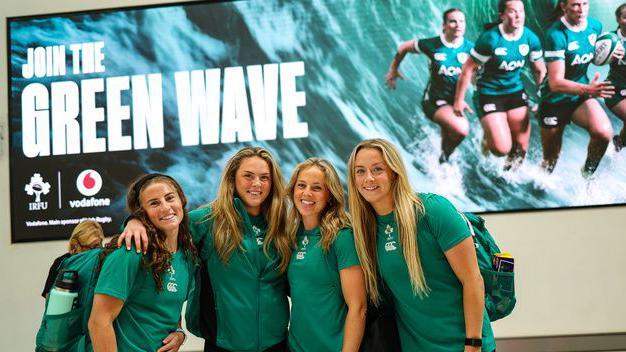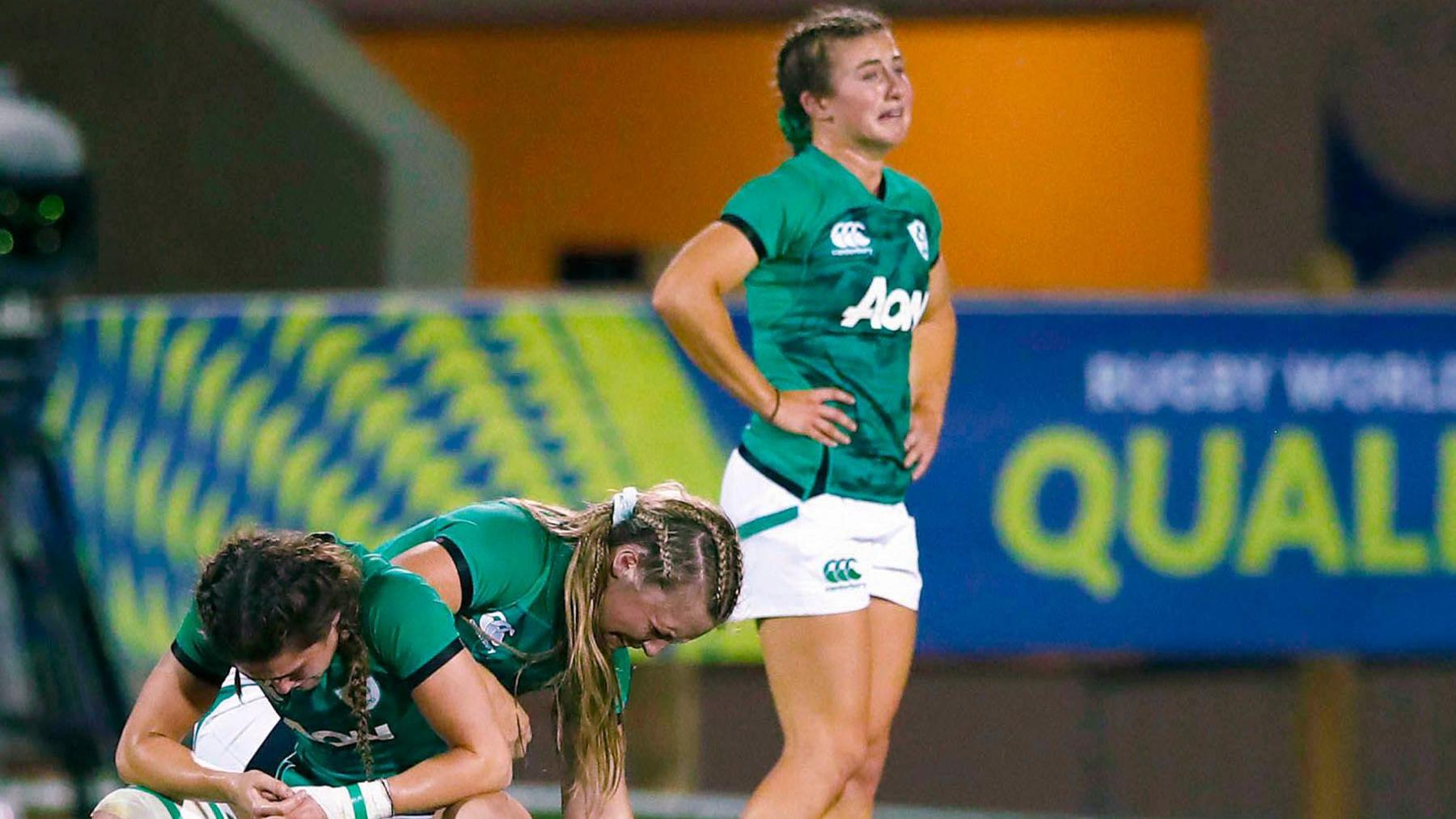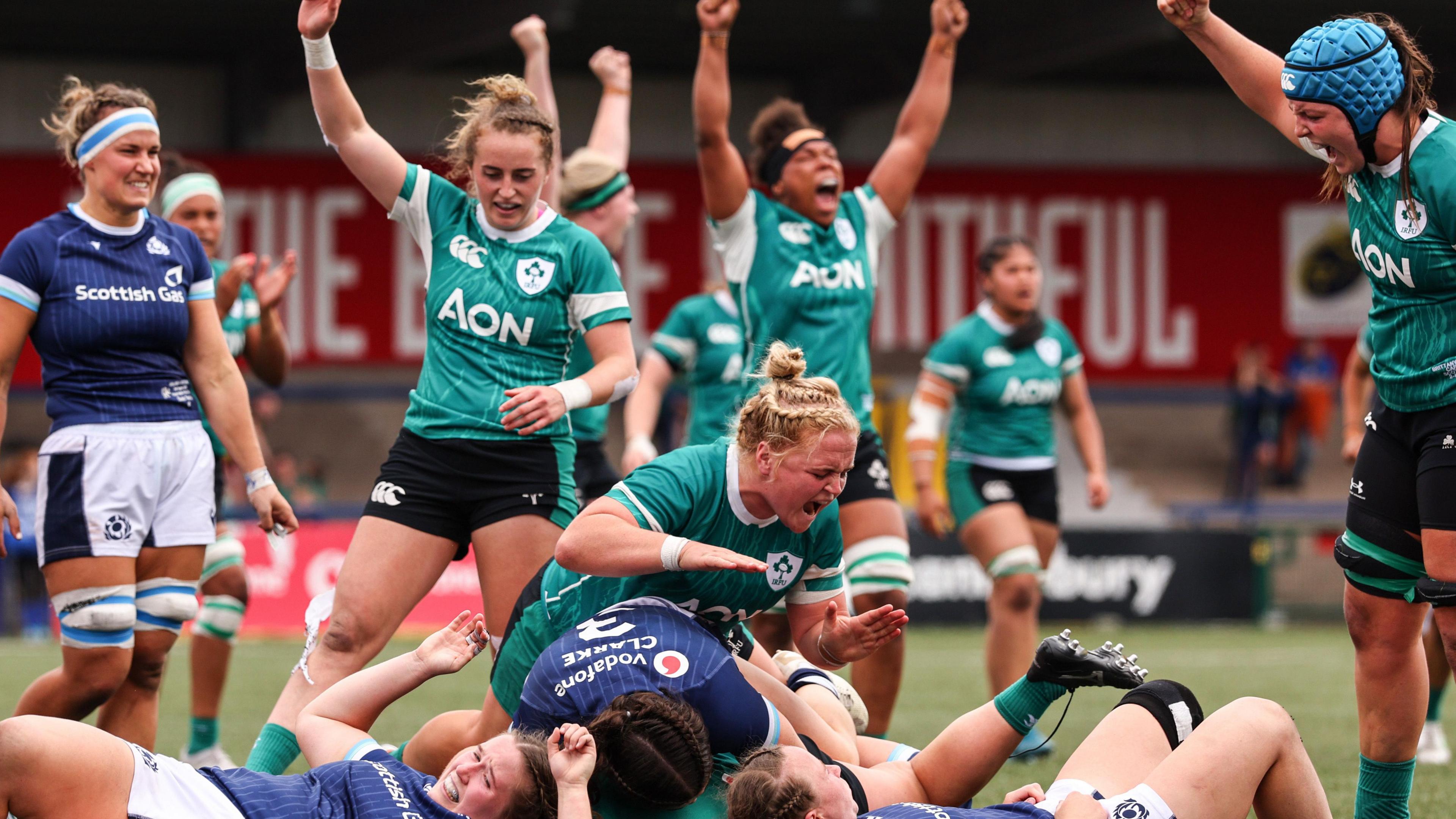'Slurry spreading to the Green Wave' - Ireland's World Cup transformation

Ireland's journey back to the World Cup has been dubbed 'the green wave'
- Published
Women's Rugby World Cup - Pool C: Ireland v Japan
Venue: Franklin's Gardens, Northampton Date: Sunday, 24 August Kick-off: 12:00 BST
Coverage: Live on BBC Two, BBC Radio 5 Sports Extra, BBC Sport website and app.
When Tommy Bowe presented the Ireland squad with their jerseys before the final Women's Rugby World Cup warm-up fixture with Canada, the 79-time capped winger told the assembled group that "the whole country was 100% behind" them.
While the recent groundswell of support for the team has since been dubbed the 'Green Wave', the significance of the statement will not have been lost on a team who, at the start of this shortened three-year cycle, did not feel they had the backing of even their own union.
Ireland have arrived at the tournament with a legitimate claim to be the most improved side since the World Cup was last staged, a tournament that was played without them.
In truth, since making the semi-finals in 2014, and through a pool stage exit on home soil in 2017, recent World Cups have been a series of diminishing returns. Yet, if their failure to even qualify for New Zealand three years ago was expected at the time to represent a nadir, instead it proved only an accelerant to reaching rock bottom.
Defeats by Scotland and Spain in September 2021 ensured Ireland would miss the last global showpiece, but it was only in the aftermath that the stark reality of how much needed to change within the women's game in the country was made clear.
At the forefront of the fallout were accusations that the sevens side had been given undue priority.
When then Irish Rugby Football Union (IRFU) director of women's rugby Anthony Eddy gave a defensive interview stating that the women's XVs side had not been neglected, his comments were dismissed as "slurry spreading" by hooker Cliodhna Moloney-MacDonald.
The very same month as the damaging episode in Parma, there were additional damning headlines after Ulster and Connacht players were pictured changing next to rubbish bins before an interprovincial derby, which hardly helped the union's case.
The fraught relationship and true extent of the rift between players and the IRFU was then fully exposed when a group containing both current and former players sent a letter to the Irish government stating a loss of "all trust and confidence" in the organisation.
That less than four years later Ireland are back at the World Cup and targeting a deep run in the competition is testament to a level of progress that has surprised many, including even their own head coach Scott Bemand.
- Published11 August
- Published15 August
Ireland appointed Bemand as their head coach in July 2023 with the former England assistant inheriting a squad who had been whitewashed in that year's Six Nations.
Under his guidance, the side finished third in the championship in successive years and were promoted into the top tier of WXV where last autumn they shocked world champions New Zealand, a side they will face again in the pool stages this month.
"He's a phenomenal coach," says 20-year-old prop Sadhbh McGrath of Bemand.
"I've learned so much under him and I think I've really come on as a rugby player ever since he's entered the programme, just my game understanding [and] rugby IQ.
"Genuinely, he's done so much work with us."
The stark reversal of Ireland's fortunes is far from limited to the impact of one person, however. Nor have the coaching changes been limited to solely on the field with flanker Claire Boles highlighting the impact of high-performance leadership and cultural lead Sean M Ryan.
"We have great coaching staff at the moment, they're really, really good," said Boles who arrives at the World Cup after representing Ireland Sevens at the Paris Olympics last summer.
"They value us all as people and players, and we also had a performance coach come in, Sean Ryan.
"He really taught us all about culture and what it means just to be honest with everyone. It definitely brought us closer."

Ireland missed out on the World Cup in 2022 thanks to defeats by Spain and Scoltand
While internationals of an older vintage will surely feel that such structures should have been put in place long before the side began their slide down the world rankings, their belated implementation has allowed players to focus more on the games themselves.
Although those "slurry spreading" comments did precede a period of international exile, Moloney-MacDonald is the only player in this year's squad who was also present when Ireland were last at the World Cup in 2017.
"Probably the biggest change actually for me from the last number of years is that you can confidently focus on in between the white lines now," said the Exeter player, one of seven players in the squad who ply their trade in Premiership Women's Rugby (PWR).
Among the changes implemented after a pair of independent reviews into performance and structure were the first professional contracts for XVs players - Ireland were the last of the Six Nations sides to make this step - the creation of the new position of head of women's performance and pathways filled by Gillian McDarby, and the establishment of a women's national talent squad (WNTS) with a stated aim to "identify, develop and support female players that have the potential to be selected for national squads".
Among that first group of WNTS players in 2022 were Aoife Dalton and Dannah O'Brien, two players who figure to play big roles at this World Cup.
While there is still work to be done on the domestic season's structure, and questions over the level of opposition in both the All-Ireland League and Celtic Challenge competitions remain, Moloney-MacDonald feels young players coming into the squad are now more ready than ever before for the step up to Test rugby.
"They've been part of quite high-performance environments for a while with the national talent squads and with Celtic Challenge, even the level that the interpros are going to, so when they come into this environment, they're now prepared, they're not coming straight from club rugby, which is really good.
"They've got experience of a scheduled week, travelling to away games and stuff like that, silly things that you wouldn't maybe have [previously] experienced.
"Certainly when I came in, I had no experience of that."

Ireland beat Scotland but lost to Canada in their warm-up fixtures
Although this Ireland team have recent experience of beating New Zealand, the presence of the Black Ferns in their pool presents a formidable roadblock to the aspirations of a side who have already lost key players Erin King and Dorothy Wall to injury and have fitness doubts over star back row Aoife Wafer.
With games against Japan and Spain to come before facing the back-to-back world champions, Ireland could be sure of their quarter-final place before their final pool game, but a runners-up spot is likely only to bring about a last-eight encounter with France, a side Ireland have not beaten since the 2017 Six Nations.
But after such a tumultuous period, Ireland's success at this tournament will not be measured solely by wins and losses.
"We kind of call it our North Star, [that] everyone wants girls' rugby and women's rugby to go places here," said Boles.
"It's not just for these next few weeks, it's a longer story for us. We want to cultivate for the next few years so everyone's joining the Green Wave.
"Everyone knows you don't go into a tournament without wanting to win but it's also, on the outside, you just want to get another wee girl into a green jersey."